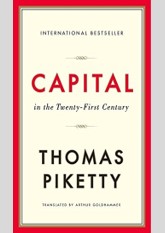Capital in the Twenty-First Century
What are the grand dynamics that drive the accumulation and distribution of capital? Questions about the long-term evolution of inequality, the concentration of wealth, and the prospects for economic growth lie at the heart of political economy. But satisfactory answers have been hard to find for lack of adequate data and clear guiding theories. In Capital in the Twenty-First Century, Thomas Piketty analyzes a unique collection of data from twenty countries, ranging as far back as the eighteenth century, to uncover key economic and social patterns. His findings will transform debate and set the agenda for the next generation of thought about wealth and inequality.Piketty shows that modern economic growth and the diffusion of knowledge have allowed us to avoid inequalities on the apocalyptic scale predicted by Karl Marx. But we have not modified the deep structures of capital and inequality as much as we thought in the optimistic decades following World War II. The main driver of inequality—the tendency of returns on capital to exceed the rate of economic growth—today threatens to generate extreme inequalities that stir discontent and undermine democratic values. But economic trends are not acts of God. Political action has curbed dangerous inequalities in the past, Piketty says, and may do so again.A work of extraordinary ambition, originality, and rigor, Capital in the Twenty-First Century reorients our understanding of economic history and confronts us with sobering lessons for today.
Recent ratings for this book on Bookelphia
5
1 Ratings
Varun Shetty
Reviewed on: 27-01-2021
This book, 'Capital in the Twenty-First Century' addresses your thought provoking questions about various aspects of capital and its flow. It talks about many questions about long term evolution of basic social problems like inequality, the vast concentration of wealth amongst a minority population bracket and how the prospects of the economic growth of a developing nation lie at the heart of the political economy. Due to lack of data, satisfactory answers were scarce in the past. This book gives you the right answers with detailed and concise explanations.

